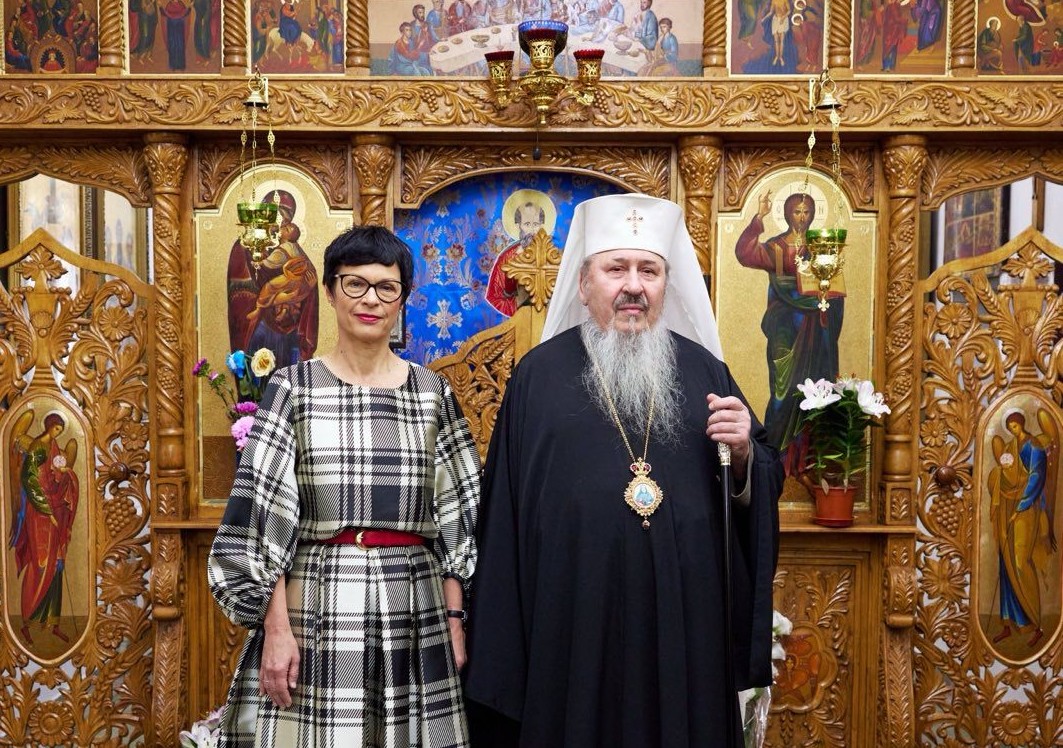
Metropolitan See of Bessarabia reaffirms support for Moldova's European path; Metropolitan Petru meets European Commissioner for Enlargement
The Metropolitan See of Bessarabia, an integral part of the Romanian Orthodox Church, responsibly and openly supports the benefits that accession to the European Union can bring to Moldova – from safety and stability to social and cultural protection, as well as supporting initiatives that increase the Church's visibility and trust in the public space. The message was conveyed by Most Right Reverend Petru, Archbishop of Chisinau, Metropolitan of Bessarabia, and Exarch of the Lands, at a meeting with Marta Kos, European Commissioner for Enlargement, on a visit Chisinau.
“The Metropolitan See of Bessarabia, through the voice of the metropolitan synod and through the ministry of its clergy, has consistently proved that it supports the wish of believers to anchor Moldova in European values, reaffirming that the European path is also a path of memory, freedom and dignity,” a statement by the Metropolitan See of Bessarabia reads.
Father Petru emphasized that the Metropolitan See of Bessarabia has always been faithful to the aspirations of the Bessarabian people, recalling including the fight in the 1990s at the European Court of Human Rights for the recognition and assertion of its rights.
During the discussion, the sides addressed the challenges and opportunities of the European integration process, with a focus on the role of religious denominations in protecting freedom of faith, financing projects to conserve and promote cultural and religious heritage and strengthening an active role of the Church in society.
After the meeting, European Commissioner visited the Chapel of Saint John the Theologian, where Metropolitan Petru presented the history of the place and the main projects of the Metropolitan See. The official agenda continued at the Ministry of Culture, where a round table was held with representatives of more religious denominations.
The participants highlighted the need of keeping the liturgical space away from political propaganda, emphasizing the incompatibility of electoral messages with the preaching of the Gospel. At the same time, attention was drawn to the risk of relativizing the atheist communist past, a period marked by religious persecutions and trials of the spiritual identity of the people.
Former MP free in Greece
VIDEO // National Army celebrates 34 years since establishment
Over 850 COVID-19 cases reported in Moldova in past week
PHOTO GALLERY // Welcome ceremony for first-year students; enrollees at Nicolae Testemitanu Medical University of Moldova recite student's oath
Moldovan government donates minibus for children in south-east Moldova village
VIDEO // Three people detained following searches in south Moldova; group allegedly aimed to bribe voters through PSB application of Russian bank Promsvyazbank
Forest Festival returns at presidential residence in Condrița on 14 September
VIDEO // Morning raids in southern Moldova
Chisinau city hall warns citizens about heavy rains recorded in Moldovan capital on September 1 evening
Metropolitan See of Bessarabia reaffirms support for Moldova's European path; Metropolitan Petru meets European Commissioner for Enlargement
Moldovan farmers to become more resilient with financial support of European Union, Czech Republic
Over 1,000 sparkling wines from 29 countries to be evaluated by jury made up of more than 50 international tasters
Serghei Tarnovschi wins silver medal at Canoe Marathon World Championships
Breaking news
Former democratic leader could be brought back to Moldova in coming weeks
MOLDPRES interview // Minister of Internal Affairs: Moldova experiencing wave of concerted attacks from abroad and supported by criminal groups
Speaker: Russia's plan to capture Moldova to fail as Moldovans won't sell country
Educational farm to be set up at College of Veterinary Medicine and Agrarian Economics in Brătușeni, with support of Czech Republic
New raids on electoral corruption and money laundering cases
Six teams of firefighters mobilized for fire in Moldovan capital
Moldovan PM has dialogue with European Commissioner for Enlargement
Pre-electoral mission of Parliamentary Assembly of Council of Europe visits Moldova's parliament
Moldovan president urges international election observation missions to be vigilant, to expose foreign interferences
Banking sector of Moldova aligns with European standards through corporate governance projects
Judges, prosecutors trained in Chisinau for resolving electoral disputes
Moldovan president, European commissioner for enlargement discuss EU accession process, projects under growth plan


